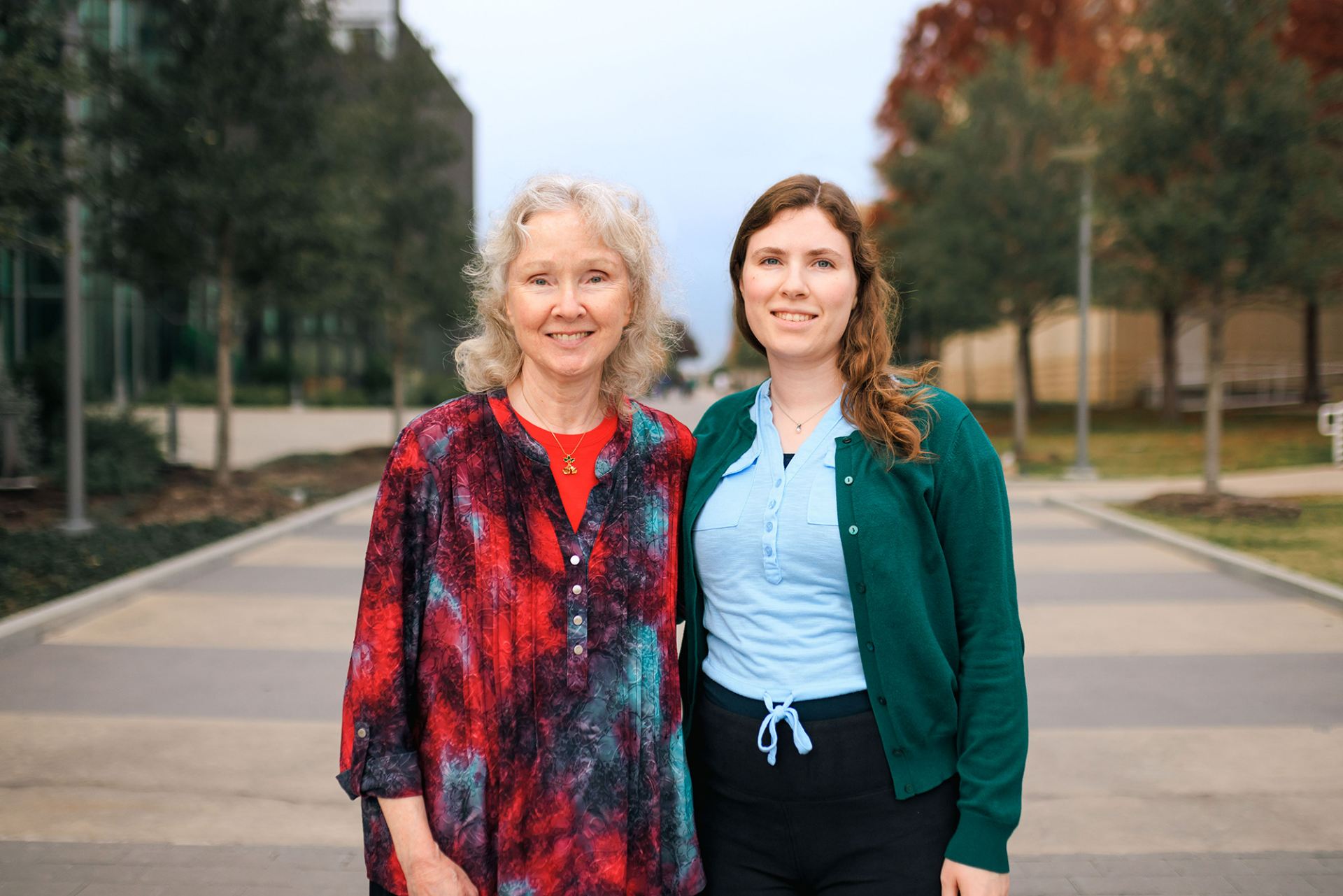Engineer’s Graduation To Become Family Affair at Doctoral Ceremony
By: Jessica Good | Dec. 14, 2022

When Roberta Hawkins MS’87, MS’19, PhD’22 needed help with the quantum mechanics homework in her doctoral studies, she didn’t have to look far — just across the Sunday dinner table.
Her daughter, Jessica BS’12, BS’12, MS’14, PhD’18, tutored her every week. Her husband, Greg MS’03, was on daily math help duty. And son Scott BS’09, MS’10 pitched in, too.
“It’s a fond family memory,” Roberta said.
When Roberta receives her doctoral hood in materials science and engineering from the Erik Jonsson School of Engineering and Computer Science at The University of Texas at Dallas on Dec. 16, Jessica will be there to assist her mom again.
“It just seemed natural to be a part of the ceremony because I’ve been there for all of the journey. I’m very proud of her,” Jessica said.
Roberta began her UT Dallas journey when she was a semiconductor process engineer for Texas Instruments (TI) in the 1980s and ’90s, taking a one-year leave of absence to pursue a graduate degree in chemistry. She originally chose UTD because of its affiliation with TI, where Greg, who earned his master’s degree in electrical engineering, also worked.
Commencement Coverage
- Schedule
- Livestreams
- Parking maps (PDFs): Activity Center and Arts and Technology Lecture Hall ceremonies
- Digital commencement program
- Graduation website
- News Center: Schools To Celebrate Grads’ Crowning Achievements
- On Instagram: Veteran Cord Ceremony photos
- On social media: Graduates are encouraged to share their celebrations and memories by using #UTDgrad.
“UT Dallas has a lot of people at TI and other technical companies who take courses without necessarily pursuing degrees. It’s pretty common to have part-time students,” Roberta said. “So, it’s nice that no matter what your age or job situation, you feel like you can always go to UTD.”
Roberta earned her first master’s degree in chemistry (later, she would earn a second master’s in materials science and engineering), and then she and Greg took a break from their educational pursuits when Jessica and Scott were born. When it was time for them to go to college, both kids followed their parents’ footsteps to UTD.
Jessica went on to earn a bachelor’s in computer science as well as three other degrees — all in physics. Scott graduated with bachelor’s and master’s degrees in computer science after transferring from another university.
“At the other university, Scott didn’t get to know his professors, due to large class sizes,” Roberta said. “But at UT Dallas, he absolutely knew his professors very well. So that’s one of the big advantages of this school.”
For Roberta, being the oldest student in her PhD program had its advantages.
“I was able to mentor the younger students, and they were able to mentor me. It worked both ways,” the 64-year-old said. “Some of them helped me with homework. They helped me find a research professor.
“The disadvantage of age is that you may have forgotten things — like calculus — that you learned maybe 40 years ago.”
Roberta didn’t mind often being the only female engineer in the room during her academic and professional career. She still hopes to see more women studying science, technology, engineering and math.
“It just seemed natural to be a part of the ceremony because I’ve been there for all of the journey. I’m very proud of her.”
Jessica Hawkins BS’12, BS’12, MS’14, PhD’18
“I have wanted to figure out how to get more women interested. I can’t believe we’re in 2022, and there are still not very many women in these fields,” she said.
Jessica said her mom is a role model for women. “She’s had a career in semiconductor engineering for my whole life,” she said.
For Roberta, the moment of receiving her PhD will not be the end of anything, but rather a beginning.
Her second love after engineering is music. She plays the violin, viola and piano and has been a member of UTD’s string orchestra in the past. She hopes to join the group again next semester as she will be on campus as an employee of Akash Systems, which uses space in the UT Dallas Cleanroom Research Laboratory.
“I’ll be developing manufacturing processes for electronic components intended for use in satellites,” she said.
And the idea of being hooded by her daughter? “We think it’s cool,” Roberta said. “We’re proud of each other.”
Media Contact: Jessica Good, UT Dallas, 972-883-4319, jessica.good@utdallas.edu, or the Office of Media Relations, UT Dallas, (972) 883-2155, newscenter@utdallas.edu.





